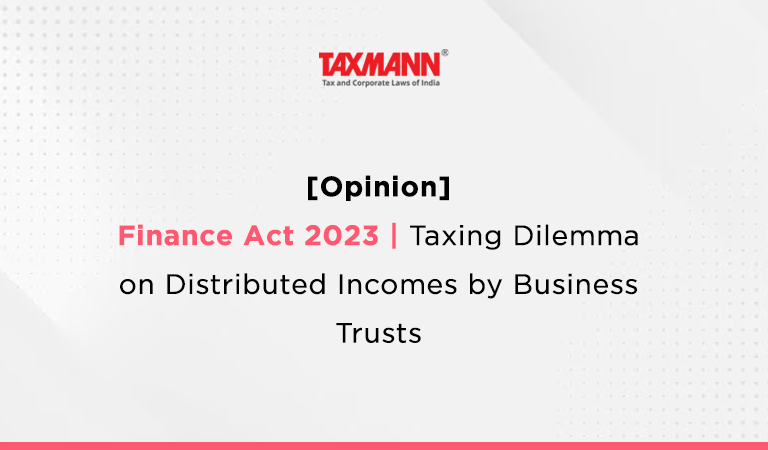[Opinion] Finance Act 2023 | Taxing Dilemma on Distributed Incomes by Business Trusts
- Blog|News|Income Tax|
- 2 Min Read
- By Taxmann
- |
- Last Updated on 14 April, 2023

Jimit Devani, Parth Shah & Reema Rathod – [2023] 149 taxmann.com 136 (Article)
The Finance Bill, 2023 (introduced on 1 Feb 2023) received presidential assent and accordingly Finance Act, 2023 is applicable from financial year 2023-24. The bill was introduced in the Lok Sabha on 24 March 2023, wherein new amendments were made, and some proposed amendments were modified. One such important amendment is in relation to taxation of income in the hands of unit holders of business trusts (i.e. Infrastructure Investment Trusts and Real Estate Investment Trusts).
The Finance Bill, 2023 (introduced on 1 Feb 2023) had proposed to insert clause (xii) to section 56(2) of the Income Tax Act, 1961 (‘Act’) to provide that any sum received by a unit holder from a business trust is considered income of the unitholder, except if the sum received is in the nature of interest or dividend from SPV, or rental income from a REIT, or if it is taxable in the hands of the business trust under section 115UA.
The Finance Act, 2023, revamped the proposed section and substituted the same with a new provision contained in clause (xii) of section 56(2) and also inserted explanations 1 and 2 to clause (ii) of section 48.
This article attempts to understand the aforesaid amendments including the interpretational issues that can come up on practical application.
Rationale for the introduction of new provisions?
- Unit holders of business trusts are entitled to receive distributions from the business trusts on account of income earned by such Trusts. Certain incomes earned by the business trusts are accorded a pass-through status and accordingly taxable at the unit holders’ level.
- It is an industry wide practice to categorize some of the distributions to the unit holders as repayment of debt.
- Prior to amendment, there was no express provision under the Act to tax such distribution and accordingly, a view was taken that the amount categorized as repayment of debt was not taxable either at business trust level or at the unit holders’ level.
- In order to overcome this, various amendments are made in the Act to tax the distributions made by the business trusts in the hands of the unit holders.
Click Here To Read The Full Article
Disclaimer: The content/information published on the website is only for general information of the user and shall not be construed as legal advice. While the Taxmann has exercised reasonable efforts to ensure the veracity of information/content published, Taxmann shall be under no liability in any manner whatsoever for incorrect information, if any.

Taxmann Publications has a dedicated in-house Research & Editorial Team. This team consists of a team of Chartered Accountants, Company Secretaries, and Lawyers. This team works under the guidance and supervision of editor-in-chief Mr Rakesh Bhargava.
The Research and Editorial Team is responsible for developing reliable and accurate content for the readers. The team follows the six-sigma approach to achieve the benchmark of zero error in its publications and research platforms. The team ensures that the following publication guidelines are thoroughly followed while developing the content:
- The statutory material is obtained only from the authorized and reliable sources
- All the latest developments in the judicial and legislative fields are covered
- Prepare the analytical write-ups on current, controversial, and important issues to help the readers to understand the concept and its implications
- Every content published by Taxmann is complete, accurate and lucid
- All evidence-based statements are supported with proper reference to Section, Circular No., Notification No. or citations
- The golden rules of grammar, style and consistency are thoroughly followed
- Font and size that’s easy to read and remain consistent across all imprint and digital publications are applied



 CA | CS | CMA
CA | CS | CMA
